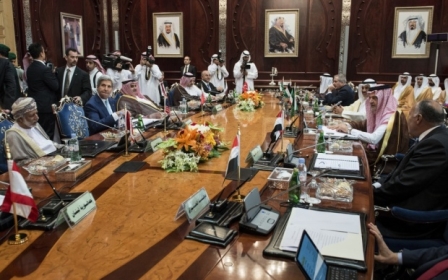As IS nears border, Turkey to debate joining coalition

Islamic State fighters have closed to within a few kilometres of a key Kurdish town on Syria's border with Turkey, as Ankara mulls joining the anti-IS coalition with strong signals it will come on board.
On Monday, as the militant group advanced towards Kobane - also known as Ain al-Arab - Turkey deployed tanks to reinforce its side of the border.
The Turkish parliament is scheduled to debate on Thursday whether the country will join the international coalition against the militants operating on the country's doorstep.
The US-led coalition carried out new raids against IS positions, but the militants still managed to advance within five kilometres (three miles) of Kobane, a monitor said.
It was the closest the militants had come to the town since they began advancing towards it nearly two weeks ago, sending tens of thousands of mostly Kurdish refugees across the border, said the Syrian Observatory for Human Rights.
As they advanced, the militants fired at least 15 rockets at the town centre, killing at least one person. Other rockets hit the border zone.
Across the frontier, Turkey's army was seen deploying tanks and armoured vehicles to the town of Mursitpinar, after stray bullets hit Turkish villages and at least three mortar shells crashed nearby.
In Ankara, parliamentary speaker Cemil Cicek was reported to have said that motions for discussions on Turkey joining the coalition could land with lawmakers on Tuesday. Prime Minister Ahmet Davutoglu said they would be debated on Thursday.
In recent weeks, Turkish officials have been cautious about joining the coalition. Last week, even while President Recep Tayyip Erdogan gave indications during a trip to New York for the UN General Assembly that the country was inching towards joining the coalition, Prime Minister Ahmet Davutoglu released a statement denying that Incirlik Base in southern Turkey had been used for strikes in Syria.
Some analysts had suggested that Ankara would become more active once 49 Turkish hostages, held by IS, were released.
But even after they arrived home on a Turkish Airlines plane on 20 September, analysts also highlighted taht Turkey might still be hemmed in by a burgeoning Islamic State threat within the country, used as a recruiting ground for the group and a pathway for its fighters headed to Syria and Iraq.
Sinan Ulgen, a former Turkish diplomat and President of Istanbul based think-tank EDAM, told MEE contributor Cagri Ozdemir that it is more this internal threat, than the hostages, that has put Turkey in a tight position.
"In other words, Turkey was not pacified because of the hostage situation, but more than that, IS's organisation in Turkey and the latent threat of terrorist attacks makes it difficult for Turkey to adopt drastic measures," Ulgen told MEE.
While it seems likely that the Turkish parliament will authorise military action this week, MEE contributor and Turkish analyst David Barchard said the country is likely to exact two demands for its involvement: a firm commitment by the US to bring down Assad’s government and action against the US-based Gulen movement.
Across the border in Syria, however, a senior source told MEE's Jonathan Steele that US President Barack Obama's speech to the UN General Assembly last week gave them hope that the US is leaning towards pulling together a conference of regional players that would include Syria and that Washington will resume direct contact with Damascus.
“They can’t change suddenly and quickly, but I feel they’re going to change,” the source told Steele. “A conference of all regional powers which included Syria would be good.”
PHOTO GALLERY: SYRIAN KURDS FLEE THE ISLAMIC STATE
Stay informed with MEE's newsletters
Sign up to get the latest alerts, insights and analysis, starting with Turkey Unpacked
Middle East Eye delivers independent and unrivalled coverage and analysis of the Middle East, North Africa and beyond. To learn more about republishing this content and the associated fees, please fill out this form. More about MEE can be found here.




